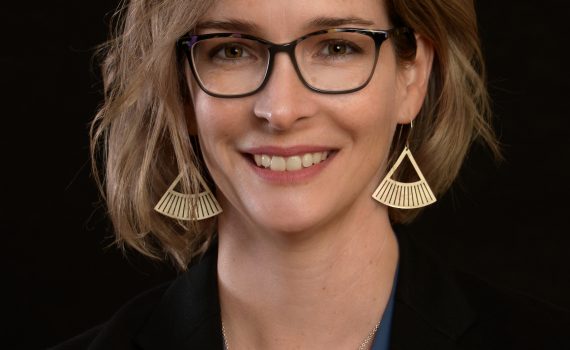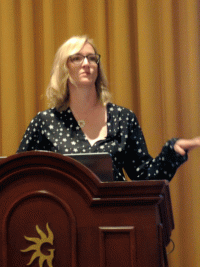
Episode 005: Alisa Bonsignore–Public Speaker
Category:Introverted Leadership,Leadership,personality,Podcast,STC,SummitPodcast: Play in new window | Download
Subscribe: Spotify | Amazon Music | iHeartRadio | Podchaser | TuneIn | Deezer | RSS
Episode 005 Show Notes: Alisa Bonsignore
Introduction
 Alisa Bonsignore is the principal of Clarifying Complex Ideas, a strategic communications consultancy in the Bay Area with clients around the world. Alisa Bonsignore and Ben Woelk discuss public speaking and the stress and value of Q&A, and how being an introvert with the INFJ temperament type affects her roles.
Alisa Bonsignore is the principal of Clarifying Complex Ideas, a strategic communications consultancy in the Bay Area with clients around the world. Alisa Bonsignore and Ben Woelk discuss public speaking and the stress and value of Q&A, and how being an introvert with the INFJ temperament type affects her roles.
- Twitter: @ClearWriter
- Email: hello@clarifyingcomplexideas.com
Key concepts
- Keirsey Temperament Theory
- Public speaking and stress
- Empathy
- Situations and scenarios
- Counseling
Quotable
As an adult, you associate public speaking with your experience as a student, and when you’re a student, you’re up there and somebody is grading you and they’re looking for ways you’re doing it wrong.
They’re in your talk for a reason, and they’re not there to criticize you or to grade you or to challenge you. They’re there because you have something that they want to learn about and when you shift that mindset that you have something valuable to say, it really changes your perspective on speaking.
Instead of listening to the surface, I understand the subtext of things a lot better, which is incredibly helpful with getting to the real problem instead of just painting over the problem that seems to be at the surface.
What brings the consensus here… is that we could do this other thing and that would solve everybody’s problems. And people go, “Oh, well, I was so wedded to my idea… that it never occurred to me that there was another option.” …It’s a lot like counseling, actually–family counseling–family counseling for groups and teams. .
Resources or Products Mentioned in this Episode
- Society for Technical Communication
- Rochester Institute of Technology
- Clarifying Complex Ideas
- STC Intercom magazine
- MBTI
- Keirsey
- Heart monitor
Links
- Follow Hope for the Introvert on Twitter
- Like my page on Facebook
- Support me on Patreon
- Get swag for Hope for the Introvert and Introverted Leadership at Zazzle
Transcript
Ben: Joining us today is Alisa Bonsignore. Alisa runs Clarifying Complex Ideas, a strategic communications consultancy in the Bay Area. Her professional mission is to create clarity and build engagement, giving people the information they need when they need it. Alisa helps companies communicate complicated topics, including policy development and sustainability communications surrounding the UN sustainable development goals (SDG), medical devices and pharmaceuticals/genomics, network security, and healthcare information technology. You can contact Alisa at hello@clarifyingcomplexideas.com or on Twitter @Clearwriter.
Ben: Thank you for joining us again, Alisa. I look forward to us continuing our conversation!
Ben: One thing that Alisa and I have talked about previously is where we stand on Keirsey Temperament theory and where our MBTI letters come out, and Alisa is an INFJ, which is typically a counselor-type role. She’s very cognizant of the people issues that are going on. I’m an INTJ, which can be described as architect or scientist, or the one I really like, mastermind, but the problem with that is that I’m not always attuned to what’s going on with the people. And one of the ways this has been described is that, say that you’re on an ocean liner and the engine breaks down. As the INTJ, I would be down in the engine room–assuming I had any of those mechanical skills–I would be down in the engine room trying to figure out how to get it started. Alisa would be busy making sure that the people got off the ship, so there’s definitely a focus difference in terms of this rational versus idealist-type traits, the way that Keirsey puts it. And I think that this is an example then because I don’t necessarily tend to think of what were the motivations? Why was this person saying this? Sometimes I do, but probably not nearly as often as I should.
Alisa: And see, that’s a huge thing for me because it’s a huge part of figuring out when people contact me and say, “I need you to do this urgent project and here’s my rationale for why,” I can usually by the time I’ve talked it through with them, figure out you’re saying on the surface that it’s because of this, but really, the pressure’s coming from another source and let’s talk a little bit more about that. Maybe this isn’t actually what you need. You need a solution to this other problem that you think is this item, but actually your problem could be fixed with a different approach.
Ben: Alisa, one thing that I’ve had conversations with other guests on this podcast is presenting. Now, all of us that have talked so far on the podcast have been introverts. All of us present fairly often, but when we talk to people who–whether they’re extrovert or introvert, many people are totally intimidated by the idea of speaking in front of groups. What is your experience been speaking in front of groups? How did you get started? What have you found that’s helpful, and any interesting anecdotes that you could share?
Alisa: [laughing] So I actually started–my presentation life was doing a lot of sales training for different clients or different in-house companies that I worked for–so it was working with select groups on select topics, but what I realized pretty early on, is that as an adult, you-you associate public speaking with your experience as a student, and when you’re a student, you’re up there and somebody is grading you and they’re looking for ways you’re doing it wrong. Right? So when I was in high school at one point I had to recite Hamlet’s monologue–the “To be or not to be,” right? And of course my teacher’s sitting there listening to make sure that I get every word exactly right. There’s a different level of pressure there when you’re trying to make sure that you have memorized exactly every word in exactly the right order to communicate what you need to do to get the grade.
Alisa: By the time you’re an adult, nobody’s grading you, and you don’t realize this right away [laughing]–what you’re up there doing–you have a purpose up there. You’re up there telling people something that they actually want to hear–especially if you’re speaking at a conference. I mean, maybe not at a sales meeting–they might just have rolled in because they have to roll in and listen to you–but at a conference especially, there are other choices. These people could be at another session. They could be out having coffee with a friend. They could be blowing off the conference entirely and boondoggling with their employer. Who knows, right? But they’re in your talk for a reason, and they’re not there to criticize you or to grade you or to challenge you. They’re there because you have something that they want to learn about and when you shift that mindset that you have something valuable to say, it really changes your perspective on speaking.
Alisa: Now, having said that, that’s not to say that it’s not stressful in its own way. I like to approach every talk as if it’s a conversation, so I pick a couple of people in the room that I can sort of speak to and feel like I’m having a conversation with. I can make eye contact with them. I can communicate with them directly rather than feeling like I’m just talking to a large, faceless group. That definitely helps. But, in spite of that, I’ve also discovered that I still get a little bit stressed about the whole thing. Even though on the surface everything seems calm, I still get a little stressed. So it happened to be that one day I was giving a talk at a local STC chapter, and earlier that day I had gone in for a routine appointment with my cardiologist, and because I hadn’t had a Holter monitor–the portable monitor–in several years, they wanted to do just a follow-up check to make sure everything’s the same, blah, blah blah.
Alisa: So I ended up going to my talk completely rigged up–wires everywhere–this apparatus hanging from my belt. I-I look like a crazy person and I’ve tried to like pull my sweater up over my neck. Right? But nobody knows that I’ve got this on, hopefully. But, here I am. I’m fully rigged up like a patient. Right? And so I go through the whole talk and everything seemed fine and I’m really good through the part that I have rehearsed and practiced, whatever. And then we get to the Q&A [laughing], and later when the doctor called back and was like, “Um, so about what were you doing at this time?” I’m like, “Oh, that was the question and answer portion of my conversation.” [laughing] Literally, my heart rate had gone above my target heart rate for like running sprints. It was just completely through the roof.
Alisa: And I–I didn’t–I mean I know that there’s a little bit of anxiety there, but I had no idea that it was really like above 180 beats per minute. [laughing] This is some serious stress here! But, this also explains why I feel so exhausted when it’s all done. I put all of my energy into this, but you can only script so much of it and then–then you’re let loose with the Q&A and the conversation, and you don’t know what’s going to happen. [laughing] So apparently that, that unnerves me a little bit, a little bit more than I realized.
Ben: Yeah, that is such a funny anecdote and you said you were aware that you were a little stressed, but you–I guess you didn’t have any idea how much until you actually saw it measured.
Alisa: No, no. You get that sort of, [inhaling] okay, what’s this person going to ask me? There’s a little bit of nerves there, but I had no idea it was that level of cardiac response! [laughing]
Ben: So, I guess one solution would be not to leave any time for questions and answers at the end of a presentation…
Alisa: Yeah, but the Q&A is actually the best part. I mean this is where you have really good conversations with people and once–once I’m into–once they’ve asked me the question, and I–we’re having that conversation, the one-on-one. It’s great, but there’s that moment before they begin where it’s like, [inhaling] “Ooh, what are they going to say? [laughing] I don’t know if I’m prepared. Will I have an answer?” There’s nerves there more so than I had imagined.
Ben: That’s amazing. It’s such a good story.
Ben: Another question for you here–part of what we’re doing during the series, during the Hope for the Introvert podcasts, is talking about our biggest strengths and how we leverage them, and also the biggest challenges we face. What do you believe your biggest strengths are as an introvert? And in what ways do you see that you’ve leveraged them?
Alisa: So as you were saying earlier about my feeler status, right? I’m the empath. I feel what people are needing and experiencing. I think that I have leveraged my ability to understand people’s motives. I think that that’s really gone a long way from like, instead of listening to the surface, I understand the subtext of things a lot better, which is incredibly helpful with getting to the real problem instead of just painting over the problem that seems to be at the surface. But I think for me–right, but it’s also because I’m a good listener. It’s the fact that I’m not always the one talking. I mean, you watch the extroverts in the meetings, right? They’re not getting the feedback. They’re always pushing information out. They’re always talking. And if you’re always talking, you’re probably not listening. So, from my perspective, I’m the one who’s listening to everybody and generally not talking, so I’m not only hearing, I’m watching the nuance that’s going on and how people are responding to each other and how the dynamic is going in addition to the actual words that are being said, and the emotion that’s being conveyed or whatever it might be going on in the room. So I’m good for that.
Alisa: I’m good at identifying customers’ pain points because I can feel the pain. It’s the empathy thing, right?” But I can understand in context, if we’re writing documentation for–let’s say that my client is selling the ventilators to assist with breathing in the hospital, right? Well, if we’re writing one kind of documentation for the initial setup, that’s one thing, because you’ve got somebody who rolls in in the middle of the day in a normal situation and plugs it in and tests it and sees that it’s working, and whatever. But it’s a very different thing, if you’re trying to do a troubleshooting document, because it could be three in the morning. You could have a natural disaster or a terrorist attack, a whatever, a ton of people coming in. You’re triaging people. You need to get the ventilator working. It’s not working. How does this work? Oh my God, you’re not at your peak of attention or focus or clarity. How do you find a clear and easy way to help this person get the device back online? Right?
Alisa: So understanding the situations and the scenarios and how to make–how to create the best tools for people in their various situations–I’m pretty good at that. I’m pretty good at understanding where we need to simplify, where we need more detail, that kind of thing. But, and I think from a client perspective, my J of my INFJ is Judging, which means that I’m task oriented and I haven’t missed a deadline in my life. [laughing] That’s just not something I do. So as an independent, this is incredibly useful to my clients because I’m very reliable. They know that not only will I meet the deadline, I’ll probably have it in early, and one of my clients once said to me, you know, you return everything early. I know that if you ever miss a deadline, you’re probably dead. [laughing]
Ben: Hmm. It’s interesting and part of being that individual contributor, working with the clients, sometimes you can set deadlines that are realistic in that you can–you can achieve those deadlines or you can turn things in in advance of those deadlines. So that can be a really big deal.
Ben: One other thing that you had said in terms of being a very, very good listener. One thing that’s important there I think, and we’re talking about the extrovert-introvert difference here, and I don’t want to paint extroverts with too broad a brush, but there is often a case where people are waiting to say what they want to say and so they’re just waiting for the other person to finish, so they can jump in with what they wanted to contribute, and I think what I’m hearing from you is that you’re more willing to sit back, let the conversation happen, and then bring up pertinent points when appropriate, rather than, “Oh, oh, oh! I know what I want to say here. Please finish up talking so I can say what I want to say.” So I think that’s one of the big differences, and again, I would not accuse all extroverts of doing that, nor would I say that I’m never guilty of that myself.
Alisa: No, no. But there are definitely people who–introvert or extrovert–there are definitely people whose meeting persona is more dominant and people whose meeting persona is more reserved, and I’m definitely one of the more reserved people, because–I am just not by my nature–I’m just not the person who gets into the thick of things in a large group, inasmuch as, “Okay. So we’ve been talking about this for half an hour. You’ve said this, you’ve said this, you’ve said this.” What brings the consensus here is that what we could do is that we could do this other thing and that would solve everybody’s problems. And people go, “Oh, well, I was so wedded to my idea and I was so wedded to my idea that it never occurred to me that there was another option.” Right? So yeah, it’s a lot like counseling, actually. Family counseling, family counseling for groups and teams. [laughing]
Ben: Which gets into your whole INFJ counselor temperament type again.
Alisa: Right, exactly!
Ben: We’ve enjoyed today’s conversation and look forward to continuing the conversation in our next podcast.
Extras
Alisa has a Twitter bot that is sometimes hysterical. https://twitter.com/alisa_ebooks










1 Comment
Warning: Trying to access array offset on value of type null in /home/theint16/public_html/wp-content/themes/enigma-premium-advance3-7-3/core/comment-function.php on line 11
Episode 005: Alisa Bonsignore–Public Speaker – Technical Writing World
February 14, 2019at 9:59 am[…] The full article is available here. […]